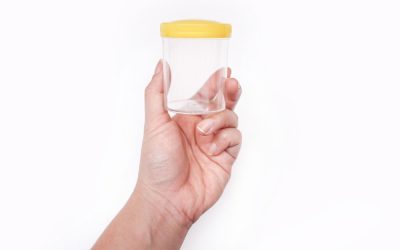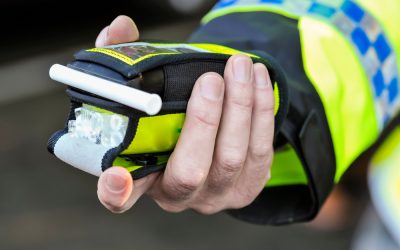DUI breath test machines can only sense the amount of alcohol vapor in your breath. They don’t test the amount of alcohol in your blood. DUI convictions are based on blood alcohol concentration or BAC. So breath tests have to calculate BAC based on the breath result, and the results can be completely wrong.
To do this calculation, every breath test device must use a ratio known as the “blood-breath partition ratio.” The tests use the same ratio for everyone, even though we know that isn’t always accurate. This leaves room to challenge the breath test results.
What Is the Blood-Breath Partition Ratio?
The blood-breath partition (BBP) ratio is a number that reflects how much alcohol the lungs absorb from the blood. Under the California Code of Regulations Title 17 §1220.4(f), this ratio is set at 2100:1. In other words, the amount of alcohol in 2,100 milliliters of air from the lungs is the same as the amount of alcohol in 1 milliliter of blood from the same person at the same time.
This ratio is roughly accurate for most people, but it’s not accurate for everybody all the time. In fact, people’s lungs absorb alcohol at very different rates, so that the BBP ratio can be wildly wrong in any given case. If that happens, you could get a high breath test result even if you’re not that intoxicated.
What Causes the BBP Ratio to Be Off for Some People?
There are many factors. Every individual’s metabolism is different, so there is an enormous variation from one individual to the next. But, even for just one person, the rate at which their lungs absorb alcohol can change under different circumstances.
For example:
- If your breath temperature is high for any reason, the test will give a higher BAC reading.
- If you have a fever, you could get a falsely high BAC reading.
- Dehydration for any reason can cause a higher BAC reading.
As you can see, the margin for error is very high. Everyone’s body functions and acts differently, so you should always question the validity of breath tests.
Can I Use the BBP Ratio as a Defense in My DUI case?
It depends. California charges most DUIs under one of two sections of California Vehicle Code (CVC) §23152:
- CVC §23152(a), which says you were impaired by alcohol or drugs, or
- CVC §23152(b), which states your BAC result was .08% or higher
If you get charged under CVC §23152(a), then your DUI lawyer can introduce evidence about the BBP ratio and use it to attempt to discredit your breath test. This is because people who have a lower BAC are less likely to be “impaired,” and thus, there is doubt about whether you’re guilty at all. If the BBP ratio was off in a way that could have elevated your breath test result, you may not have been impaired at all.
But if you were charged under CVC §23152(b), evidence about the BBP ratio will not be considered. This is because simply testing at .08% BAC or higher on an approved testing device is enough to convict you.
How Do I Prove that the BBP Ratio Was Wrong in My DUI Breath Test?
The only way to know for sure whether the BBP ratio is accurate would be to give a suspect both a blood test and a breath test at the same time and compare the results. Since our criminal justice system doesn’t do this, there is always room for doubt. Generally, your lawyer will work to introduce evidence that:
- You were sick or running a fever at the time of your DUI arrest.
- You were dehydrated.
- Your car, the weather, or the precinct where you got tested was particularly warm.
- You engaged in an activity that may have raised your body temperature and breath temperature.
Questioning the BBP ratio is not, on its own, a sure-fire win. But it can make a crucial difference, especially in cases where your BAC was close to .08%.
In these cases, questions about the BBP ratio mean that you may have been legally sober, and the prosecution is likely to offer you a deal. They may even drop the charges.
What Will Happen If I Get Convicted from My Breath Test Results?
Once you get convicted with your breath test results, whether they were accurate or not, you face several administrative and legal penalties associated with DUI. There is a chance you can expunge or overturn your conviction, but these aren’t easily done and can take a considerable amount of time.
The penalties you face from a DUI can leave you with lasting negative impacts on your life. Some of the adverse effects can hurt you for years to come.
Don’t let this happen to you. Your best bet at avoiding these harsh penalties is by fighting against your breath test results.
Should I Get a Lawyer to Help Me?
You should get an experienced lawyer to help you question the results of your DUI breath test. The BBP ratio isn’t always accurate, and getting convicted on an inaccuracy can lead to many negative consequences down the line. If your test results aren’t accurate beyond a reasonable doubt, you can defend yourself from your charges.
Using a BBP ratio defense isn’t easy. But, if you don’t know where to start, our Los Angeles DUI attorneys can help. We can assist you in building a strong defense for your case and ensure that you get the best outcome possible. The last thing we want is to see you get punished over testing inaccuracies.
Don’t Always Trust Your Breath Test Results
While a breath test is an excellent way for the police to catch intoxicated drivers, that doesn’t mean it’s always correct every time. So get in touch with one of our Los Angeles DUI attorneys today to learn more about how we can help you fight for your defense.
Schedule an appointment for a free consultation today online or over the phone. We are available 24/7 to assist.







